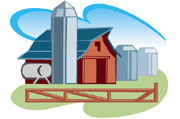Bulletin #2323, Maine Farm Safety Program: Big Tractor Safety
 Bulletin #2323, Maine Farm Safety Program: Big Tractor Safety (PDF)
Bulletin #2323, Maine Farm Safety Program: Big Tractor Safety (PDF)
By Dawna L. Cyr, Farm Safety Project Assistant, and Steven B. Johnson, Ph.D., Extension Crops Specialist
For information about UMaine Extension programs and resources, visit extension.umaine.edu.
Find more of our publications and books at extension.umaine.edu/publications/.
Giant four-wheel-drive tractors are now used on many farms. Though most safety recommendations apply to both large and small tractors, there are special safety concerns when operating super-sized tractors. The tractor’s dimensions may cause difficulties in tight places, at corners and gates, and on narrow roadways. Overhead clearances, especially around power lines, may cause a problem.
Steering Problems
The unique steering systems of large 4-wheel-drive tractors present new handling problems, especially for beginning drivers. All-wheel steering can shift a towed device into an unexpected path. Articulated steering changes the rig’s center of gravity so that an overturn can occur under unexpected conditions. With articulate steering, high-speed road travel requires more operating skill than conventional tractor steering does.
If an operator steers a unit with articulated steering while it is standing still, a bystander can be trapped in the hinge region. All new tractors carry warnings, but it is the operator’s responsibility to be sure everyone is clear before starting or maneuvering the machine.
- Extra caution is needed when taking articulated tractors at high road speeds.
- Be careful. Big tires can hide small children.
- Tight turns, narrow gates and overhead obstructions may cause additional problems with big tractors.
Safety Reminders
- Watch your step. Use the handholds when climbing up and down the cab access steps or ladder.
- Clear them of mud and ice. Clean your shoes or boots before mounting the tractor.
- Refuel with care. It takes longer to fill the big tanks. You may have to climb up and find a secure position from which to refuel. Do not smoke while refueling.
- Be sure everyone is out of the way before moving. A child, worker or animal next to or under a big rig may be hidden from view.
- Drive slowly when approaching tight turns, narrow gates, buildings and overhead obstructions that are not problems for smaller tractors.
- Remember heavily ballasted, big tractors cannot stop quickly. When the tractor tows a heavy wagon without brakes, the added load may increase the stopping distance to an unsafe degree, especially on downgrades. Slow down early. Equip large wagons with brakes. Keep tractor brakes properly adjusted and equalized.
- Steer articulated four-wheel drive tractors with care at transport speed to assure straight-line tracking. Slow down if the tractor’s rear section begins to fishtail. Avoid steep side slopes. Do not pull so far to the right on roads that right-side wheels are in the ditch. The rear section of the tractor could then slide into a jack-knife position, resulting in loss of control or an overturn.
- Be sure that small bridges, floors, and flatbeds will support the big tractor’s weight and width before driving onto these surfaces.
This Maine Farm Safety fact sheet is part of an educational fact sheet series produced by University of Maine Cooperative Extension. For more information on farm safety, contact your UMaine Extension County Office.
Information in this publication is provided purely for educational purposes. No responsibility is assumed for any problems associated with the use of products or services mentioned. No endorsement of products or companies is intended, nor is criticism of unnamed products or companies implied.
© 2002, 2020
Call 800.287.0274 (in Maine), or 207.581.3188, for information on publications and program offerings from University of Maine Cooperative Extension, or visit extension.umaine.edu.
The University of Maine is an EEO/AA employer, and does not discriminate on the grounds of race, color, religion, sex, sexual orientation, transgender status, gender expression, national origin, citizenship status, age, disability, genetic information or veteran’s status in employment, education, and all other programs and activities. The following person has been designated to handle inquiries regarding non-discrimination policies: Director of Equal Opportunity, 101 North Stevens Hall, University of Maine, Orono, ME 04469-5754, 207.581.1226, TTY 711 (Maine Relay System).

